Politics in Estonia takes place in a framework of a parliamentary representative democratic republic, whereby the Prime Minister of Estonia is the head of government, and of a multi-party system. Legislative power is vested in the Estonian parliament. Executive power is exercised by the government, which is led by the prime minister. The judiciary is independent of the executive and the legislature. Estonia is a member of the United Nations, the European Union, and NATO.

The president of France, officially the president of the French Republic, is the executive head of state of France, and the commander-in-chief of the French Armed Forces. As the presidency is the supreme magistracy of the country, the position is the highest office in France. The powers, functions and duties of prior presidential offices, in addition to their relation with the prime minister and government of France, have over time differed with the various constitutional documents since the Second Republic.
The politics of Slovenia takes place in a framework of a parliamentary representative democratic republic, whereby the Prime Minister of Slovenia is the head of government, and of a multi-party system. Executive power is exercised by the Government of Slovenia. Legislative power is vested in the National Assembly and in minor part in the National Council. The judiciary of Slovenia is independent of the executive and the legislature. Slovenia is a Member State of the European Union and is represented in the Council of the EU and through elections to the European Parliament.
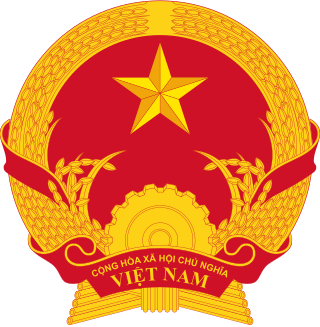
The politics of Vietnam is dominated by a single party under an authoritarian system, the Communist Party of Vietnam (CPV). The President of Vietnam is the head of state, and the Prime Minister of Vietnam is the head of government, both of these are separate from the General Secretary of the Communist Party of Vietnam who leads the CPV and is head of the Politburo and the Central Military Commission, thus the General Secretary is the de facto supreme leader of Vietnam. Executive power is exercised by the government and the President of Vietnam. Legislative power is vested in the National Assembly of Vietnam. The Judiciary is independent of the executive. The parliament adopted the current Constitution of Vietnam, its fifth, on 28 November 2013.

The Government of the Republic of Armenia or the executive branch of the Armenian government is an executive council of government ministers in Armenia. It is one of the three main governmental branches of Armenia and is headed by the Prime Minister of Armenia.
The Government of Poland takes the form of a unitary parliamentary representative democratic republic, whereby the President is the head of state and the Prime Minister is the head of government. However, its form of government has also been identified as semi-presidential.

The president of the Republic of Korea, also known as the president of South Korea (Korean: 대통령), is the head of state and head of government of the Republic of Korea. The president leads the State Council, and is the chief of the executive branch of the national government as well as the commander-in-chief of the Republic of Korea Armed Forces.

The prime minister of France, officially the prime minister of the French Republic, is the head of government of the French Republic and the leader of the Council of Ministers.

The president of the Democratic Republic of the Congo is the head of state of the Democratic Republic of the Congo and commander-in-chief of the armed forces.
The government of Czechoslovakia under Marxism–Leninism was in theory a dictatorship of the proletariat. In practice, it was a one-party dictatorship run by the Communist Party of Czechoslovakia, the KSC.
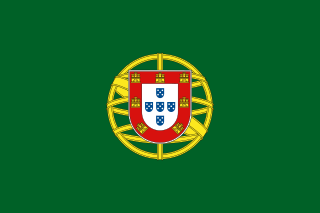
The president of Portugal, officially the president of the Portuguese Republic, is the head of state and highest office of Portugal.

Alojz "Lojze" Peterle is a Slovenian politician. He is a member of New Slovenia, part of the European People's Party. He served as Prime Minister of Slovenia from 1990 to 1992, Leader of the Christian Democrats from the founding of the party in 1990 until it merged with the Slovenian People's Party in 2000, and was Minister of Foreign Affairs from 1993 to 1994 and again in 2000. He was a Member of the National Assembly from 1996 to 2004, and a Member of the European Parliament from 2004 to 2019.
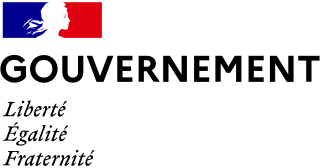
The government of France, officially the Government of the French Republic, exercises executive power in France. It is composed of the prime minister, who is the head of government, as well as both senior and junior ministers. The Council of Ministers, the main executive organ of the government, was established in the Constitution in 1958. Its members meet weekly at the Élysée Palace in Paris. The meetings are presided over by the President of France, the head of state, although the officeholder is not a member of the government.

The Prime Minister of the Lao People's Democratic Republic, formerly the chairman of the Council of Government of the Lao People's Democratic Republic, is the head of government of Laos. The highest position in the government, they direct the country's executive branch. The prime minister is accountable to the president, the National Assembly and the country's only legal party: the Lao People's Revolutionary Party (LPRP). The current prime minister is Sonexay Siphandone, who was elected in 2022.

The Government of South Korea is the national government of the Republic of Korea, created by the Constitution of South Korea as the executive, legislative and judicial authority of the republic. The president acts as the head of state and is the highest figure of executive authority in the country, followed by the prime minister and government ministers in decreasing order.
The Government of the Republic of Slovenia exercises executive authority in Slovenia pursuant to the Constitution and the laws of Slovenia. It is also the highest administrative authority in Slovenia.

The prime minister of Slovenia, officially the president of the Government of the Republic of Slovenia, is the head of the Government of the Republic of Slovenia. There have been nine officeholders since the country gained parliamentary democracy in 1989 and independence in 1991.
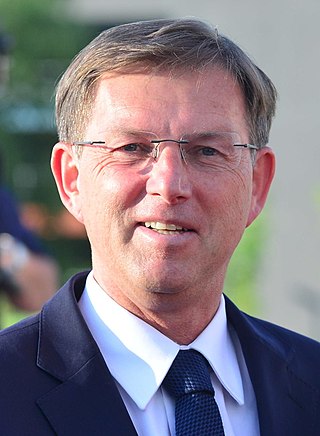
Miroslav Cerar Jr. is a Slovenian law professor and politician. He was Prime Minister of Slovenia, leading the 12th Government. He served as Deputy Prime Minister and Minister of Foreign Affairs in the 13th Government. He is a full professor at the Chair of Theory and Sociology of Law at the University of Ljubljana Faculty of Law.

Georgia–Slovenia relations are the bilateral relations between Georgia and Slovenia, two European nations with a communist past that established their bilateral ties in 1993. Their relations have been highly represented with a close diplomatic partnership, with Slovenia being one of the staunch supporters of Georgia's territorial integrity and pro-Western path. Both nations are members of the Council of Europe.
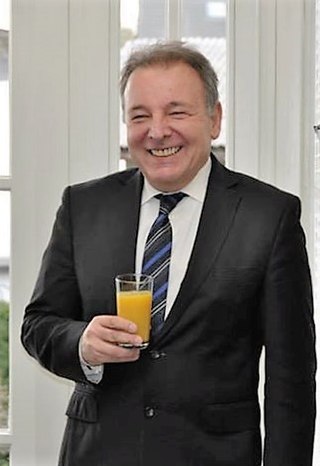
Andrej Šircelj is a Slovenian politician who has been serving as Minister of Finance in the government of Prime Minister Janez Janša since 2020.
























